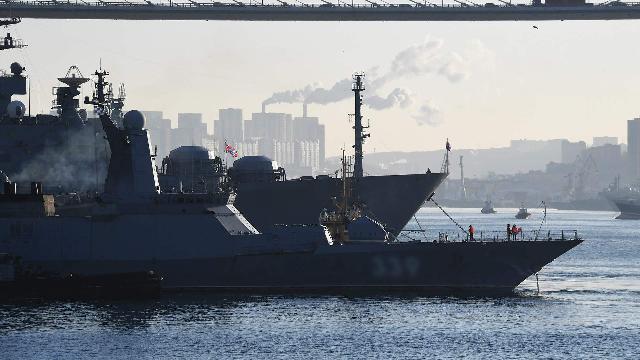A detachment of Pacific Fleet ships has arrived in Bangladesh
A detachment of ships of the Russian Pacific Fleet has arrived at the shores of Bangladesh and will enter the port of Chittagong on April 12. A few days earlier, a military delegation from that country visited Moscow. Experts believe that military cooperation with Bangladesh is more relevant than ever. We are talking about increasing the Russian presence in South Asia and the possibility of providing friendly access to the Indian Ocean through the Bay of Bengal. Many communications and trade routes also take place here.
Why is Russia developing cooperation with Bangladesh
On Saturday, April 12, a detachment of three ships of the Pacific Fleet — the corvettes Hero of the Russian Federation Aldar Tsydenzhapov, Sharp and the tanker Pechenga — will make a call at the port of Chittagong in Bangladesh. The crews of the ships will take part in cultural and sporting events. And the command will attend commemorative meetings dedicated to the events of 1972-1974, when Soviet sailors helped the authorities of this country cope with the consequences of the War of independence. At that time, the entire Chittagong water area was mined, and it was impossible to approach the fairways and berths due to flooded ships. As a result, transport ships with food could not arrive in the country and there was a threat of mass starvation.
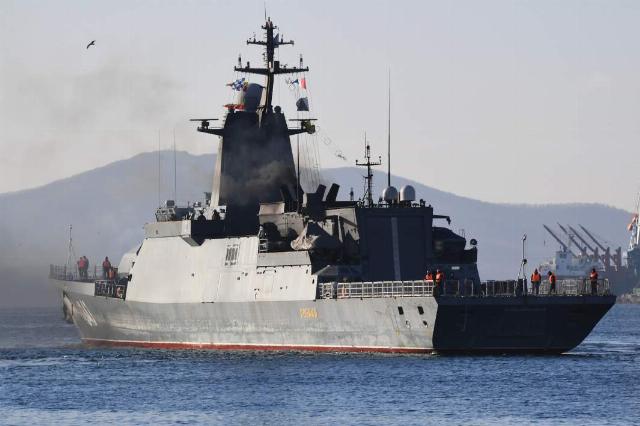
Corvette "Sharp"
Image source: Photo: RIA Novosti/Vitaly Ankov
"Then, as a result of a unique rescue operation, the Pacific sailors managed to clear the roadstead and approaches to the main port of the country as soon as possible and clear the flooded ships," the Russian Defense Ministry said.
Due to the political instability in this country, the ties of its leadership with the USSR weakened, and for almost half a century neither Soviet nor Russian ships visited Chittagong. Until 2023, when two large anti—submarine ships of the Pacific Fleet, Admiral Tributs and Admiral Panteleev, and the tanker Pechenga entered the port.
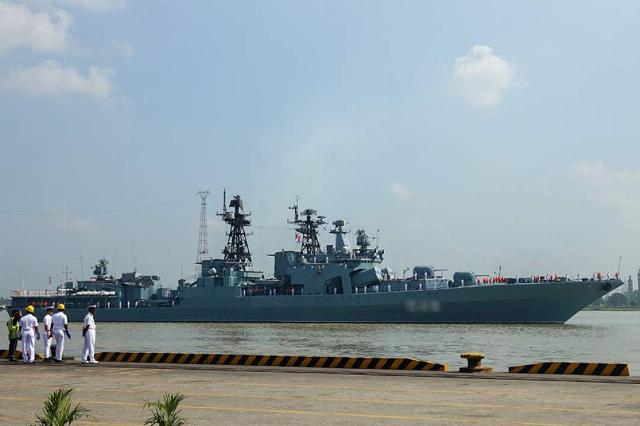
Admiral Panteleev, Large anti-submarine ship of the Russian Pacific Fleet, Chittagong, Bangladesh, November 12, 2023
Image source: Photo: TASS/Evgeny Pakhomov
— The Bay of Bengal has traditionally been of interest to many, — Maria Savishcheva, a junior researcher at the Center for the Indian Ocean Region of the Russian Academy of Sciences, told Izvestia. — This was especially vividly demonstrated in 1971, when the Soviet Union actively helped Bangladesh in the war of independence against Pakistan and prevented American ships from entering the Bay of Bengal (in that conflict, the United States supported Pakistan, the USSR and India—Bangladesh. That's when our military-technical cooperation was born. It is developing now. The technological aspects are the most significant. Not so long ago, the Rostec center appeared in the capital Dhaka, which is actively operating.
The expert recalled that in August last year, Prime Minister Sheikh Hasina fled the country, and the military elites are behind the interim government and maintain relative stability in the state.
— In this situation, military cooperation with Bangladesh seems more relevant than ever. It seems quite profitable for Russia. This is a diversification of military-technical contacts and an increased presence in the Indian Ocean and in South Asia as a whole. Now many actors are interested in strengthening their positions in the region. There are many communications and trade routes there. The United States and other countries have military bases here in the Indian Ocean. Friendly access to this ocean, including through the Bay of Bengal, serves Russian interests," concluded Maria Savishcheva.
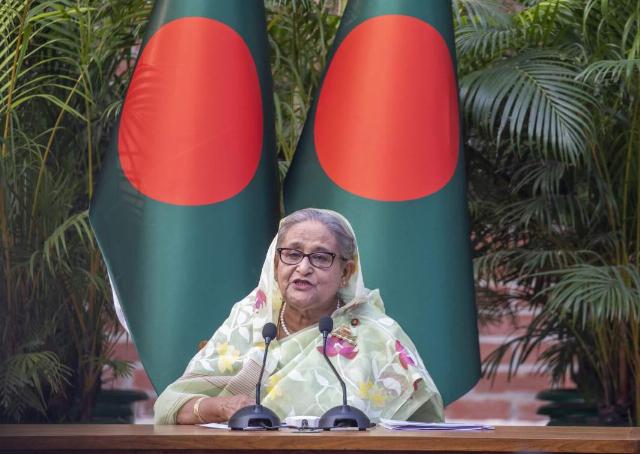
Former Prime Minister of Bangladesh Sheikh Hasina
Image source: Photo: TASS/EPA/MONIRUL ALAM
In connection with recent events, every state that treats Russia with friendship needs to be taken into account and strengthen relations with it, says military expert, Captain 1st Rank Vasily Dandykin.
"We can provide them with military assistance, and this can give us support at the international level," he said. — We need to return to South Asia, and we are returning, making friends. There are many rivals there. Therefore, it is important for us to cooperate with Bangladesh. This state is small, but occupies a serious position.
How was the visit of the Bangladesh delegation to Moscow?
On April 7-8, a delegation from Bangladesh, headed by the Commander of the Army, General Waqer Uz-Zaman, visited Moscow. On the first day, he had a working meeting with Russian Deputy Defense Minister Alexander Fomin. According to the Russian military department, the parties discussed the prospects for bilateral cooperation in the military field, and also expressed a mutual commitment to further strengthen the existing friendly relations between the armies and peoples of Russia and Bangladesh.
The next day, the Bangladesh military delegation paid tribute to the memory of Soviet soldiers at the Grave of the Unknown Soldier in the Alexander Garden. A minute of silence was held to the sounds of a metronome, then a military band performed the anthem of the Republic of Bangladesh. The ceremony ended with the parade formation of the 15th separate Commandant's Preobrazhensky Regiment.
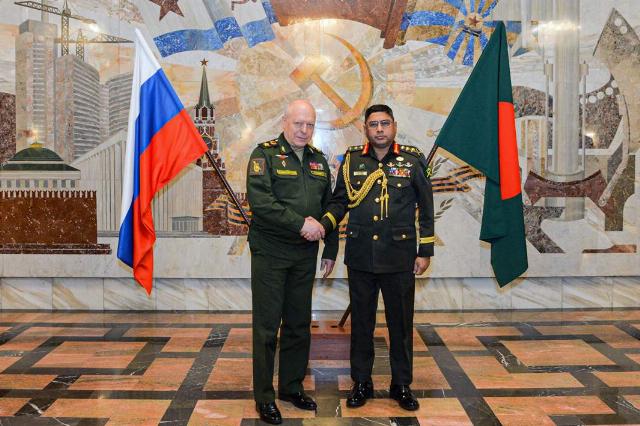
From left to right: Commander-in-Chief of the Russian Ground Forces, General of the Army Oleg Salyukov and Commander of the Ground Forces of the People's Republic of Bangladesh, General Waqer Uz-Zaman at a meeting in Moscow, April 8, 2025
Image source: Photo: RIA Novosti/Press Service of the Ministry of Defense of the Russian Federation
After that, Oleg Salyukov, Commander-in-Chief of the Russian Ground Forces, held a bilateral meeting with Wacker Uz-Zaman. According to the Russian Defense Ministry, they discussed issues of military cooperation and cooperation, the implementation of projects aimed at increasing the combat readiness of the armed forces of both countries.
—Bangladesh is considered by the Russian Federation as one of the key states in the Central Asian region, and the development of cooperation is a priority in this area today,— Salyukov stressed during the talks.
Pacific Fleet ship exercises in South Asia
In February, a detachment of Pacific Fleet ships, which includes the corvettes Sharp, Hero of the Russian Federation Aldar Tsydenzhapov and the tanker Pechenga, took part in maneuvers in Indonesia. Representatives of the USA, China, Japan, France, India, Great Britain and other countries were also involved in them. The main events took place in the waters of the Badung Strait and on the island of Bali. The main goal was to increase operational compatibility between the naval forces of different countries in the field of disaster relief and other humanitarian operations.
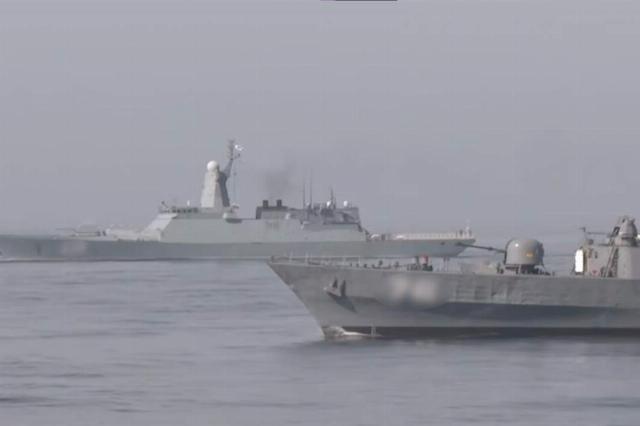
Marine Safety Belt – 2025 exercises
Image source: Photo: Ministry of Defense of the Russian Federation
In early March, the Maritime Security Belt 2025 exercises were held in the northern Indian Ocean, in which ships from Iran and China took part together with the Pacific Fleet detachment. The crews worked out the tasks of freeing captured vessels, search and rescue at sea, and conducted artillery firing at sea and air targets. On the Chinese side, two warships and one integrated supply vessel were involved in the exercises, while Iran fielded 16 warships and boats, two support vessels and two helicopters.
In mid-March, joint maneuvers of the Pacific Fleet detachment with the Pakistan Navy took place in the PASSEX format. This is a standard for naval maneuvers between two fleets, during which communication and interaction between them are checked in a military situation or when providing humanitarian assistance.
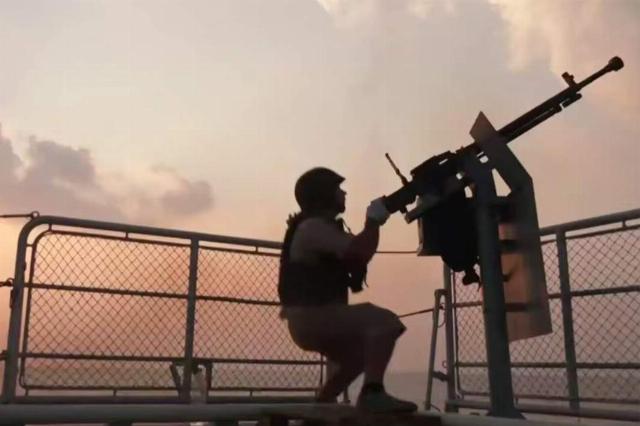
The Indra Navy - 2025 exercises
Image source: Photo: Ministry of Defense of the Russian Federation
And in early April, the Indra Navy - 2025 joint naval exercises of India and Russia took place in the Bay of Bengal. The crews of the ships of the two countries practiced tactical maneuvering as part of joint formations, the fight against drones and unmanned boats, and also conducted artillery firing at sea and air targets. In addition, the sailors completed the tasks of escorting the vessel and replenishing supplies on the move from the tanker Pechenga.
Deck-based helicopters of naval aviation were also involved. The Russian Ka-27M landed on the destroyer Rana, and the Indian Chetak landed on the deck of a Russian corvette. The main emphasis was placed on combating unmanned boats and UAVs in the daytime and at night using naval artillery, heavy machine guns and small arms of naval anti-terror units.
Roman Kretsul
